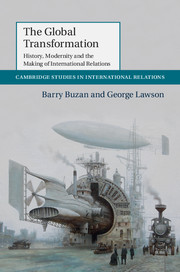Introduction
Published online by Cambridge University Press: 05 February 2015
Summary
The Global Transformation and IR
During the nineteenth century, a ‘global transformation’ remade the basic structure of international order. This transformation was profound, involving a complex configuration of industrialization, rational state-building and ideologies of progress. Because this transformation happened unevenly, it changed the distribution of power by generating a shift from a ‘polycentric world with no dominant centre’ to a ‘core–periphery’ order in which the centre of gravity resided in the West (Pomeranz, 2000: 4). Acquiring the new configuration meant undergoing wide-ranging political, economic and cultural transformations, and polities that underwent those transformations held enormous advantages over those that did not. Although oscillations of power are nothing new in human history (Morris, 2010), the global transformation opened up a vastly expanded pool of resources, making the power gap both much bigger and much more difficult to emulate. In this sense, as well as marking a shift in the distribution of power, the global transformation also changed the basic sources, or mode of power, stimulating the emergence of global modernity.
Global modernity pulled the world into a single system, within which the consequences of the changes in the mode and distribution of power were widely and deeply felt. The world had been an economic international system since the European voyages of discovery during the fifteenth and sixteenth centuries opened up sea-lanes around Africa, and across the Atlantic and Pacific Oceans (Buzan and Little, 2000: 96). Eurasia had been an economic system for two millennia. But the global ties binding such systems were thin, slow and limited in scope. Not until the nineteenth century did the world become a global system in which core states could quickly and decisively project the new mode of power around the world. In this way, multiple regional international systems were engulfed in a full international system in which all parts of the world were closely connected not just economically and culturally, but also in military-political terms (Buzan and Little, 2000; Osterhammel, 2014: 392–402).
- Type
- Chapter
- Information
- The Global TransformationHistory, Modernity and the Making of International Relations, pp. 1 - 14Publisher: Cambridge University PressPrint publication year: 2015
- 1
- Cited by

